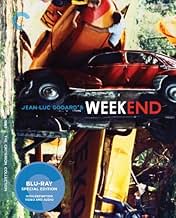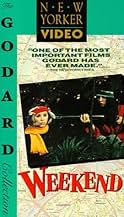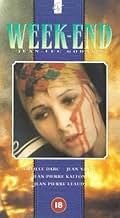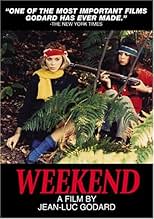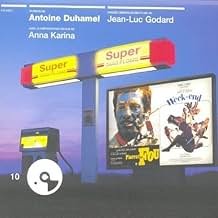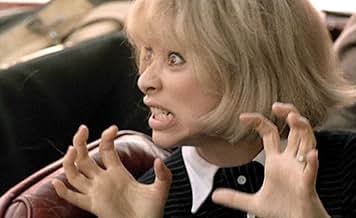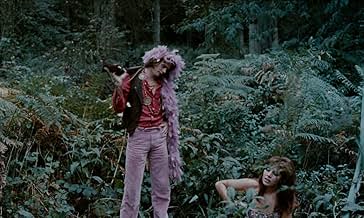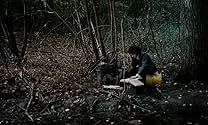NOTE IMDb
6,9/10
16 k
MA NOTE
Une histoire surréaliste d'un couple marié prenant la route afin de rendre visite aux parents de la femme et de les tuer pour l'héritage.Une histoire surréaliste d'un couple marié prenant la route afin de rendre visite aux parents de la femme et de les tuer pour l'héritage.Une histoire surréaliste d'un couple marié prenant la route afin de rendre visite aux parents de la femme et de les tuer pour l'héritage.
- Réalisation
- Scénario
- Casting principal
- Récompenses
- 1 victoire et 4 nominations au total
Yves Afonso
- Gros Poucet
- (non crédité)
Yves Beneyton
- Un membre du FLSO
- (non crédité)
Juliet Berto
- Une activiste du FLSO
- (non crédité)
- …
Michèle Breton
- Girl in the woods
- (non crédité)
Michel Cournot
- Man From Farmyard
- (non crédité)
Lex De Bruijn
- Revolutionary
- (non crédité)
Jean Eustache
- L'auto-stoppeur
- (non crédité)
Jean-Claude Guilbert
- Le clochard
- (non crédité)
Paul Gégauff
- Le pianiste
- (non crédité)
Blandine Jeanson
- Emily Bronte
- (non crédité)
Louis Jojot
- Monsieur Jojot
- (non crédité)
Valérie Lagrange
- La femme du chef du FLSO
- (non crédité)
Jean-Pierre Léaud
- Saint-Just
- (non crédité)
- …
Ernest Menzer
- Ernest - le cuisinier
- (non crédité)
- …
Sanvi Panou
- Mon frère africain
- (non crédité)
Avis à la une
I have a lot of problems with Godard's movies. I don't dispute that he is one of the great innovators of modern film making and 'Breathless' is certainly one of the few movies that changed cinema forever. But I don't really ENJOY watching 'Breathless' all that much , 'Bande a part' mostly bored me stupid , and 'Alphaville' is interesting for the most part but not exactly the most entertaining movie ever made... 'Week End' however is one of the few Godard movies I actually watch and LIKE and recommend. For most people it is one of his most difficult movies but I didn't find that to be the case. Anyone who enjoys surreal movies like those of Bunuel ('The Exterminating Angel' is name-dropped in 'Week End') or David Lynch or Peter Greenaway's underrated gem 'The Falls', or even vintage Monty Python will find this movie utterly fascinating. Corinne (Mireille Darc) and Roland (Jean Yanne) are two awful characters, almost proto-yuppies, who go on a drive to the country to weedle some money out of Corinne's parents. They immediately find themselves caught in a nightmarish traffic jam, and after that the movie get progressively weirder. Someone (I think it's Roland) says "this movie is rotten. All we meet are insane characters" (I'm paraphrasing). And that about nails it. We see Emily Bronte and fictional characters interact with Corinne and Roland, rape, murder, violence, revolution and all kinds of strangeness. The movie was released in 1967, best know as the Summer Of Love and the height of flower power, but Godard anticipates the darkness and despair of 1968 and 1969 when The Stones sang "the time is right for bloody revolution", The Stooges "1969 okay, war across the USA", The Doors "we want the world and we want it now!". 'Week End' is the anarchic side of the 1960s, not the peace'n'love'n' Woodstock 1960s. In many ways the movie is years ahead of its time anticipating (as did 'Alphaville') postmodernism. It can be difficult viewing at times, sometimes a bit frustrating if you prefer a conventional narrative, but I really really like it, and there's just nothing quite like it anywhere. If I was going to put some 1960s movies in a time capsule for future generations I would include 'Week End' alongside 'A Hard Day's Night', 'The Trip', 'Blow Up', 'Faster Pussycat! Kill! Kill!', 'Easy Rider', 'If...', 'Psycho', 'El Topo', 'Performance' and one or two others. Highly recommended inspired anarchic weirdness!
Jean-Luc Godard's cruelly ironic portrayal of the apocalypse of Western civilization through automobile accidents and petty greed effectively marked the breaking point in his career; after this, he retreated into an overtly political militant cinema for most of the late sixties/early seventies, following some of the leads here first introduced. Whatever plot there is is slowly deconstructed and disassembled throughout the film's length, as a weekend drive by cynical bourgeois couple Mireille Darc and Jean Yanne turns into a surrealist, comic nightmare of roadkill, class struggle, murder and politics as they have to face the progressively more chaotic consequences of their blind ambition and desire for power. Strikingly photographed in long one-take tracking shots, the most celebrated of which showing an apparently endless traffic jam, the film seems to defend the revolt of the proletariat until, by the end, the bourgeois wife is down with the revolutionary Liberation Front of the Seine and Oise, in a cruelly ironic plot twist that literally underlines the cannibal side of politics. With hindsight, many say that "Week End", released in 1967, effectively announced the May '68 urban uprisings in Paris and marked the beginning of Godard's politically active phase; personally, I think that Godard sensed the winds of change and jumped on the political bandwagon as a means to find the drive for his cinema to grow. And the cool, cruel detachment he bestows on the politics on display is enough to prove that his irony has seldom been more incisive than when he's being revolutionary.
10miloc
I gave this movie a 10 out of 10. I expect many people would feel hard-pressed to give it a 2 on the same scale, and I honestly wouldn't blame those who do. "Week End" is a machine built to provoke, and perhaps irritation as well as admiration can be a measure of such a machine's success.
For myself, I love it. It boils with anger, frustration, and insane energy. In one sense, it approaches film like the Cubists approached painting, breaking down images, ideas, characters and plot into startlingly photographed, almost geometric segments. But where the Cubists were to content to experiment with form Godard's instincts stay furiously political; it's as though an early Picasso had been commandeered and refitted by George Grosz.
Arrogance is not always a drawback, as rock and roll fans know-- and "Week End" is a terribly arrogant film. The director trashes every convention that he can think of. It's all thrown together-- music, dialogue, on-screen text, unvarnished political theory, frightening violence-- onto a bare hook of a plot: a young, apparently soulless couple go on a week-end trip in the middle of what appears to be the end of Western civilization. Without apologies Godard throws this mess on the table and asks the rest of us, "What have you got to match it?"
Sadly, not much. Cinema as an art has regressed rather than advanced since this film was released. (Godard himself stalled after "Week End.") Despite the rise of independently funded, non-Hollywood films in the past decade, no one seems ready to dare the sort of experimentation with what film could be that was begun in the 60s, and this is a sad thing. The films made by Godard at the height of his powers are all the more precious now. "Week End" is a document of a time when film mattered. It is an artifact, but it would only be dated if it had been surpassed. It does not rest in peace.
For myself, I love it. It boils with anger, frustration, and insane energy. In one sense, it approaches film like the Cubists approached painting, breaking down images, ideas, characters and plot into startlingly photographed, almost geometric segments. But where the Cubists were to content to experiment with form Godard's instincts stay furiously political; it's as though an early Picasso had been commandeered and refitted by George Grosz.
Arrogance is not always a drawback, as rock and roll fans know-- and "Week End" is a terribly arrogant film. The director trashes every convention that he can think of. It's all thrown together-- music, dialogue, on-screen text, unvarnished political theory, frightening violence-- onto a bare hook of a plot: a young, apparently soulless couple go on a week-end trip in the middle of what appears to be the end of Western civilization. Without apologies Godard throws this mess on the table and asks the rest of us, "What have you got to match it?"
Sadly, not much. Cinema as an art has regressed rather than advanced since this film was released. (Godard himself stalled after "Week End.") Despite the rise of independently funded, non-Hollywood films in the past decade, no one seems ready to dare the sort of experimentation with what film could be that was begun in the 60s, and this is a sad thing. The films made by Godard at the height of his powers are all the more precious now. "Week End" is a document of a time when film mattered. It is an artifact, but it would only be dated if it had been surpassed. It does not rest in peace.
Week End (1967)
** 1/2 (out of 4)
A husband (Jean Yanne) and wife (Mireille Darc), both having affairs and wanting the other dead, take a weekend trip to her dying father's house so that they can make sure they are in his will. Along the way they get in major traffic jams, get kidnapped by Jesus, run into various weirdos including a cannibal group and other strangeness. As with Godard's A Woman is a Woman, this film starts off great but quickly hits a wall and really left me cold for the final half hour or so. While I was watching the second half of the film I began to get bored very quickly and I started thinking why this was the case with the director. I'm not sure I came up with any positive answers but Godard kind of reminds me of sitting in the dark and having someone come up from behind you and scaring you. It's a great joke but he keeps on doing it to the point where it becomes tiresome and annoying. That's the feeling I got from watching this film because I loved and respected so much of it but after a while it just started to annoy me. The sequence where everything went wrong was the concert footage, which I thought just killed the mood and feel dead in its tracks. This was followed by an overly dramatic talk about blacks in America, which was then followed by a painfully long sequence dealing with the cannibals or whatever you want to call them. By the time the film ending I was rather frustrated but I guess this is just Godard being Godard. What I did enjoy about the film was the surreal and strange nature that everything is set up. There's a brilliantly done tracking shot, which goes on and on but never gets boring and in reality the sequence is quite beautiful. Godard, trying to be annoying on purpose, has everyone honking their horns for the entire scene and it really did come off funny as did all of the strange positions that the cars were in. Another great sequence happens early on when the wife talks about being seduced by another woman and her husband. This is a pretty erotic scene that's able to do more with dialogue than a lot of films do with actually showing the sexual acts. I like the way Godard demands that the viewer put themselves into the various situations but I think he, once again, goes overboard in his thoughts and ideas of the world.
** 1/2 (out of 4)
A husband (Jean Yanne) and wife (Mireille Darc), both having affairs and wanting the other dead, take a weekend trip to her dying father's house so that they can make sure they are in his will. Along the way they get in major traffic jams, get kidnapped by Jesus, run into various weirdos including a cannibal group and other strangeness. As with Godard's A Woman is a Woman, this film starts off great but quickly hits a wall and really left me cold for the final half hour or so. While I was watching the second half of the film I began to get bored very quickly and I started thinking why this was the case with the director. I'm not sure I came up with any positive answers but Godard kind of reminds me of sitting in the dark and having someone come up from behind you and scaring you. It's a great joke but he keeps on doing it to the point where it becomes tiresome and annoying. That's the feeling I got from watching this film because I loved and respected so much of it but after a while it just started to annoy me. The sequence where everything went wrong was the concert footage, which I thought just killed the mood and feel dead in its tracks. This was followed by an overly dramatic talk about blacks in America, which was then followed by a painfully long sequence dealing with the cannibals or whatever you want to call them. By the time the film ending I was rather frustrated but I guess this is just Godard being Godard. What I did enjoy about the film was the surreal and strange nature that everything is set up. There's a brilliantly done tracking shot, which goes on and on but never gets boring and in reality the sequence is quite beautiful. Godard, trying to be annoying on purpose, has everyone honking their horns for the entire scene and it really did come off funny as did all of the strange positions that the cars were in. Another great sequence happens early on when the wife talks about being seduced by another woman and her husband. This is a pretty erotic scene that's able to do more with dialogue than a lot of films do with actually showing the sexual acts. I like the way Godard demands that the viewer put themselves into the various situations but I think he, once again, goes overboard in his thoughts and ideas of the world.
'Week End' is a poor attempt to mix highbrow political attacks with a lowbrow sensibility from one of cinema's great artists. Here we have Jean-Luc Godard at both his most political, and his most experimental, throwing together ideas about Marxism, cannibalism and consumerism, and not caring one little bit whether or not the audience understands his angle of attack, or even his reason for it. Beginning the film with juvenile captions like "a film adrift in the cosmos" and "a film found on a dump", 'Week End' desperately tries to set up a nonchalant attitude to politics, society and the role of the filmmaker, but instead, simply smacks of pretension.
Godard's early movies demonstrated both a love and understanding for the medium for which he both embraced and reinvented, at the same time producing a number of classic films. However, sometime during the mid-sixties Godard became less interested in linear storytelling, and more concerned with empty provocation, which is illustrated clearly in 'Week End'. The disjointed, often rambling 'plot' follows a young Parisian couple, Roland and Corrine. Both at the height of the swinging-sixties revolution -- they openly have affairs, and delight in telling each other about their seedy escapades in sordid detail. When sex isn't motivating them, money is, or at least the prospect of money. So much so, when the chance arrives to visit Corrine's dying father, they plot to finish the old man off, and then reap the benefits of the inheritance. An odious act you might say, but up until this point the film has been quite interesting, almost enjoyable, showing us a very witty deconstruction of our preconceptions of the modern Parisian couple. But as the pair hit the road, Godard takes his message and proceeds to whack the viewer square in the face with it.
Beginning with the in/famous ten-minute tracking shot (following Roland and Corrine as the try desperately to negotiate a traffic jam on a county road), their journey takes them on an episodic odyssey that is supposed to represent a symbolic cleansing for the characters. As the film progresses they witness bizarre fairytale people who preach liberalistic nonsense, all manner of unexplained car crashes, raving lunatics and a band of terrorists. All this is supposed to strip away Roland and Corrine's bourgeois façade, making them pure human beings again. The message is blunt, unsubtle and heavy-handed, without the mindless consumerism of modern society, man and woman can function purely, as they where meant to. But despite Godard's self-confidence, it is unclear from the film where his own political allegiance lies. It would seem he feels strongly in favour of anti-commercialism/anti-consumerism, but his argument is fatuous -- and lacking sufficient and believable ammunition to back it up -- his only alternative to everyday modern life would seem to be joining a band of cannibalistic terrorists. Or maybe this was a metaphor for society's often-violent ways.
On a plus side, 'Week End' sees Godard at his most primitive, both stylistically and visually. He composes each frame with the brightest of colours, has his actors speaking monologues directly to camera, and then the aforementioned, long, unbroken tracking shots. Of course despite having an interesting quality, these stylistic flairs mean absolutely nothing. It's merely Godard's attempt to make the audience pay attention to what the characters are saying -- but since they are all speaking pure drivel it would seem to have been a bad move. By the time the film reaches its inevitable, ambiguous climax, the whole event becomes all the more tiresome. As Godard runs out of things to say (which is long after the film ceased to make sense of its ideas), he begins building up images of collective degradation and supposed black-comedy satire, neither of which work successfully... and I haven't even mentioned the acting yet.
The only decent performance you'll find that is even remotely worth watching (i.e. not entirely detestable a characterisation), is Jean-Pierre Léaud's double cameo as 'saint-just'/'singing man in phone box'. He is an extremely likable actor, familiar to audiences as the young Truffaut-alike in 'The 400 Blows'. Unlike the other cast members (with the exception of Mireille Darc as Corrine), he is clearly in sync with Godard's particular filmmaking style, and for a brief moment, makes the film almost enjoyable. I feel bad criticising Godard like this, he is a rare filmmaker, and one who has never been afraid to speak his ideas courageously -- demonstrated by the list of relevant issues here -- but they are just not communicated well enough. It's a great shame then that Godard had to make his film so heavy-handed in its ideals, and so excruciatingly slow in pace that it fails to work on any real, important level. A huge disappointment 2/5
Godard's early movies demonstrated both a love and understanding for the medium for which he both embraced and reinvented, at the same time producing a number of classic films. However, sometime during the mid-sixties Godard became less interested in linear storytelling, and more concerned with empty provocation, which is illustrated clearly in 'Week End'. The disjointed, often rambling 'plot' follows a young Parisian couple, Roland and Corrine. Both at the height of the swinging-sixties revolution -- they openly have affairs, and delight in telling each other about their seedy escapades in sordid detail. When sex isn't motivating them, money is, or at least the prospect of money. So much so, when the chance arrives to visit Corrine's dying father, they plot to finish the old man off, and then reap the benefits of the inheritance. An odious act you might say, but up until this point the film has been quite interesting, almost enjoyable, showing us a very witty deconstruction of our preconceptions of the modern Parisian couple. But as the pair hit the road, Godard takes his message and proceeds to whack the viewer square in the face with it.
Beginning with the in/famous ten-minute tracking shot (following Roland and Corrine as the try desperately to negotiate a traffic jam on a county road), their journey takes them on an episodic odyssey that is supposed to represent a symbolic cleansing for the characters. As the film progresses they witness bizarre fairytale people who preach liberalistic nonsense, all manner of unexplained car crashes, raving lunatics and a band of terrorists. All this is supposed to strip away Roland and Corrine's bourgeois façade, making them pure human beings again. The message is blunt, unsubtle and heavy-handed, without the mindless consumerism of modern society, man and woman can function purely, as they where meant to. But despite Godard's self-confidence, it is unclear from the film where his own political allegiance lies. It would seem he feels strongly in favour of anti-commercialism/anti-consumerism, but his argument is fatuous -- and lacking sufficient and believable ammunition to back it up -- his only alternative to everyday modern life would seem to be joining a band of cannibalistic terrorists. Or maybe this was a metaphor for society's often-violent ways.
On a plus side, 'Week End' sees Godard at his most primitive, both stylistically and visually. He composes each frame with the brightest of colours, has his actors speaking monologues directly to camera, and then the aforementioned, long, unbroken tracking shots. Of course despite having an interesting quality, these stylistic flairs mean absolutely nothing. It's merely Godard's attempt to make the audience pay attention to what the characters are saying -- but since they are all speaking pure drivel it would seem to have been a bad move. By the time the film reaches its inevitable, ambiguous climax, the whole event becomes all the more tiresome. As Godard runs out of things to say (which is long after the film ceased to make sense of its ideas), he begins building up images of collective degradation and supposed black-comedy satire, neither of which work successfully... and I haven't even mentioned the acting yet.
The only decent performance you'll find that is even remotely worth watching (i.e. not entirely detestable a characterisation), is Jean-Pierre Léaud's double cameo as 'saint-just'/'singing man in phone box'. He is an extremely likable actor, familiar to audiences as the young Truffaut-alike in 'The 400 Blows'. Unlike the other cast members (with the exception of Mireille Darc as Corrine), he is clearly in sync with Godard's particular filmmaking style, and for a brief moment, makes the film almost enjoyable. I feel bad criticising Godard like this, he is a rare filmmaker, and one who has never been afraid to speak his ideas courageously -- demonstrated by the list of relevant issues here -- but they are just not communicated well enough. It's a great shame then that Godard had to make his film so heavy-handed in its ideals, and so excruciatingly slow in pace that it fails to work on any real, important level. A huge disappointment 2/5
Le saviez-vous
- AnecdotesThe tracking shot of the traffic jam was the longest tracking shot in the history of cinema at that point in time as it was 300 meters long.
- Versions alternativesFor the original U.S. theatrical release, distributor Grove Press dubbed the monologues (the garbagemen's piece on black revolution and the hippie's "ocean" poem) into English, although the rest of the film was in the original French with subtitles. A short credits sequence was also appended to the end of the film.
- ConnexionsEdited into Bande-annonce De 'Week End' (1967)
Meilleurs choix
Connectez-vous pour évaluer et suivre la liste de favoris afin de recevoir des recommandations personnalisées
- How long is Weekend?Alimenté par Alexa
Détails
Box-office
- Budget
- 250 000 $US (estimé)
- Durée
- 1h 45min(105 min)
- Mixage
- Rapport de forme
- 1.66 : 1
Contribuer à cette page
Suggérer une modification ou ajouter du contenu manquant

